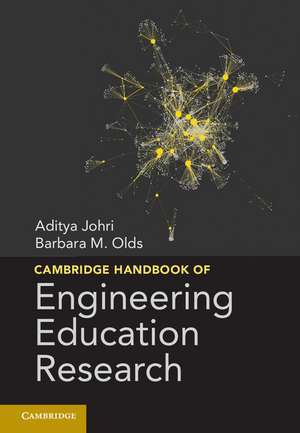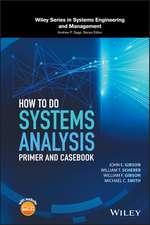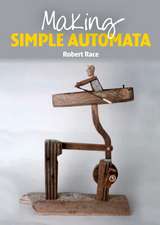Cambridge Handbook of Engineering Education Research
Editat de Aditya Johri, Barbara M. Oldsen Limba Engleză Hardback – 9 feb 2014
Preț: 968.11 lei
Preț vechi: 1257.28 lei
-23% Nou
Puncte Express: 1452
Preț estimativ în valută:
185.27€ • 201.18$ • 155.63£
185.27€ • 201.18$ • 155.63£
Carte tipărită la comandă
Livrare economică 23 aprilie-07 mai
Preluare comenzi: 021 569.72.76
Specificații
ISBN-13: 9781107014107
ISBN-10: 1107014107
Pagini: 792
Ilustrații: 63 b/w illus. 46 tables
Dimensiuni: 185 x 257 x 48 mm
Greutate: 1.59 kg
Ediția:New.
Editura: Cambridge University Press
Colecția Cambridge University Press
Locul publicării:New York, United States
ISBN-10: 1107014107
Pagini: 792
Ilustrații: 63 b/w illus. 46 tables
Dimensiuni: 185 x 257 x 48 mm
Greutate: 1.59 kg
Ediția:New.
Editura: Cambridge University Press
Colecția Cambridge University Press
Locul publicării:New York, United States
Cuprins
Foreword; Introduction; 1. Chronological and ontological development of engineering education as a field of scientific inquiry Jeff Froyd and Jack Lohmann; 2. Learning theories for engineering education practice and research Wendy Newstetter and Marilla Svinicki; 3. Situative framework for engineering learning research Aditya Johri, Barbara M. Olds and Kevin O'Connor; 4. The social nature of representational engineering knowledge Wolff-Michael Roth; 5. Conceptual change and misconceptions in engineering education: curricular-, measurement-, and theoretically focused approaches Ruth Streveler, Shane Brown, Geoffrey Herman and Devlin Monfort; 6. Engineers as problem solvers David Jonassen; 7. Professional engineering work R. Stevens, Aditya Johri and Kevin O'Connor; 8. Problem-based and project-based learning in EE - merging models Anette Kolmos and Eric De Graaff; 9. Case studies in engineering Claire Davis and Aman Yadav; 10. Curriculum design in the middle years Susan Lord and John Chen; 11. Engineering design education Cindy Atman, Jim Borgford-Parnell, Janet McDonnell, Ozgur Eris and Monica Cardella; 12. Adaptive expertise and knowledge fluency in design and innovation Ann McKenna; 13. Learning disciplinary ideas and practices through engineering design Janet Kolodner and Kristen Wendell; 14. Engineering identity Karen Tonso; 15. Studying the career pathways of engineers: an illustration with two datasets Sheri Sheppard, Shannon Gilmartin, Samantha Brunhaver and Anthony Antonio; 16. Retention and persistence in engineering education Gary Lichtenstein, Helen Chen, Karl Smith and Theresa Maldonado; 17. Social justice and inclusion: women and minorities in engineering Donna Riley, Amy Slaton and Alice Pawley; 18. Community engagement in engineering education as a way to increase inclusiveness Chris Swan, Kurt Paterson and Angela Bielefeldt; 19. Translating research to widespread practice in engineering education Tom Litzinger and Lisa Lattuca; 20. Research-guided teaching practices: engineering threshold concepts as an approach to curriculum renewal Caroline Baillie and Sally Male; 21. Engineering instruction development: programs, best practices, and recommendations Rich Felder, Rebecca Brent and Michael Prince; 22. Understanding disciplinary cultures: the first step to cultural change Elizabeth Godfrey; 23. Preparing engineering educators for engineering education research Maura Borrego and Ruth Streveler; 24. Studying teaching and learning in undergraduate engineering programs: conceptual frameworks to guide research on practice Lisa Lattuca and Tom Litzinger; 25. Design-based research in engineering education: current steps and next steps Anthony E. Kelly; 26. Quantitative and mixed-methods research: approaches and limitations Barbara Moskal and Teri Reed-Rhoades; 27. Framing qualitative methods in engineering education research: established and emerging methodologies Jenni Case and Greg Light; 28. Conducting interpretive research in engineering education Aditya Johri; 29. The science and design of assessment in engineering education Jim Pellegrino, L. V. DiBello and Sean Brophy; 30. Engineering communication M. Paretti, L. McNair and J. Leydens; 31. Use of technology in engineering education K. Madhavan and E. Lindsay; 32. Global and international issues in engineering education A. Johri and B. Jesiek; 33. Engineering ethics B. Barry and J. Herkert; 34. The normative contents of engineering formation: engineering studies G. Downey; 35. Interdisciplinarity in engineering practice N. Nerssesian and W. Newstetter; Conclusion.
Descriere
The Cambridge Handbook of Engineering Education Research is the critical reference source for the growing field of engineering education research.










